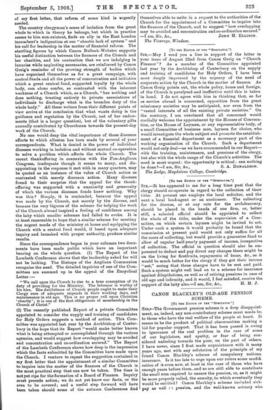[TO THE EDITOR OP THE "SPECTATOR. "' Sia,—May I send you
a line in support of the letter in your issue of August 22nd from Canon Greig on " Church Finance"? As a member of the Committee appointed lust year by the Archbishop of Canterbury on the supply and training of candidates for Holy Orders, I have been most deeply impressed by the urgency of the need of corporate action by the Church in the matter of finance. As Canon Greig points out, the whole policy, home and foreign, of the Church is paralysed and ineffective until this is taken in hand. I do not agree with him in thinking that, so far as service abroad is concerned, opposition from the great missionary societies may be anticipated, nor even from the "vested interests of all the existing private societies." On the contrary, I am convinced that all concerned would cordially welcome the appointment by the Houses of Convoca- tion, or the House of Laymen, or any representative body, of a small Committee of business men, laymen for choice, who would investigate the whole subject and promote the establish- ment of a financial department as a necessary part of the working organisation of the Church. Such a department would not only deal—as we have recommended in our Report— with the training, maintenance, and pensions of the clergy, but also with the whole range of the Church's activities. The need is most urgent: the opportunity is critical : can nothing






































 Previous page
Previous page